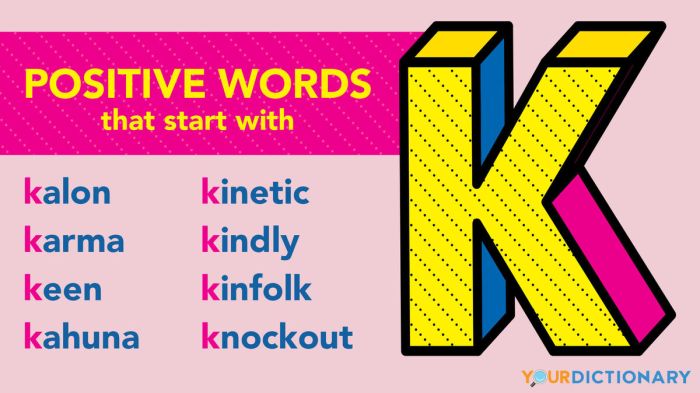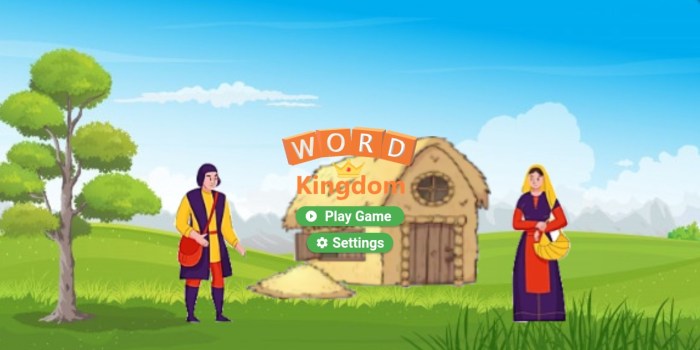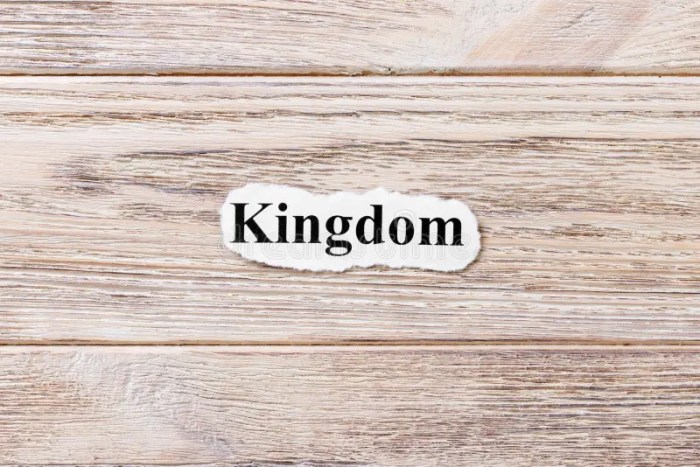Words with k i n g d o m – Words with kingdom evoke images of power, dominion, and boundless realms. From political entities to biological classifications, the concept of kingdom has permeated human thought and expression throughout history. Join us as we embark on an enthralling journey through the diverse landscapes of kingdoms, unraveling their historical significance, ecological roles, and metaphorical meanings.
In the annals of human civilization, kingdoms have played a pivotal role in shaping societies and shaping destinies. From the sprawling empires of ancient Rome to the constitutional monarchies of modern times, the structure and organization of political kingdoms have profoundly influenced the course of history.
Beyond the realm of human governance, the concept of kingdom extends into the natural world, where biological kingdoms encompass the vast diversity of life on Earth. From the majestic animals of Animalia to the intricate fungi of Fungi, each kingdom exhibits unique characteristics and ecological roles.
Kingdom as a Concept

The term “kingdom” holds diverse meanings across different spheres, encompassing political, biological, and spiritual realms. In a political context, a kingdom refers to a sovereign state headed by a monarch, typically a king or queen. Historically, kingdoms have played a significant role in shaping civilizations and governing societies.
The concept of a kingdom has undergone transformations over time, adapting to changing political landscapes and evolving notions of governance.
Historical Significance and Evolution, Words with k i n g d o m
Kingdoms emerged as a form of political organization during the ancient era. In early civilizations, such as Mesopotamia and Egypt, kings were often considered divine or semi-divine figures, wielding both political and religious authority. Over time, the role of kings evolved, with some becoming absolute monarchs while others shared power with other institutions, such as parliaments or assemblies.
The concept of a kingdom has also been influenced by cultural and religious factors, with different societies developing unique forms of monarchy.
Kingdoms in Nature
The natural world is home to an astonishing diversity of life forms, and one way to organize this diversity is through the concept of kingdoms. Biological kingdoms are broad taxonomic ranks that group together organisms based on their fundamental characteristics and evolutionary relationships.
Animalia
The Animalia kingdom encompasses a vast array of multicellular, heterotrophic organisms that move about in search of food. Animals are characterized by their ability to sense and respond to stimuli, and they exhibit a wide range of body plans and adaptations to different environments.
- Invertebrates: Animals without a backbone, such as insects, worms, and mollusks.
- Vertebrates: Animals with a backbone, including fish, amphibians, reptiles, birds, and mammals.
Plantae
The Plantae kingdom consists of multicellular, autotrophic organisms that produce their own food through photosynthesis. Plants are essential primary producers in ecosystems, converting sunlight into chemical energy that supports food chains.
- Non-vascular plants: Plants without vascular tissues, such as mosses and liverworts.
- Vascular plants: Plants with vascular tissues (xylem and phloem), such as ferns, gymnosperms, and angiosperms.
Fungi
The Fungi kingdom comprises a diverse group of eukaryotic organisms that are heterotrophic and obtain nutrients by absorbing organic matter from their surroundings. Fungi play crucial roles in nutrient cycling and decomposition in ecosystems.
- Yeasts: Single-celled fungi that reproduce by budding.
- Molds: Multicellular fungi that form visible colonies on organic matter.
- Mushrooms: Fleshy, spore-producing structures of fungi.
Ecological Roles and Relationships
The different kingdoms of life are intricately interconnected within ecosystems. Animals consume plants and other animals, while plants provide food and shelter for animals. Fungi decompose organic matter, releasing nutrients back into the soil. These ecological relationships maintain the balance and stability of ecosystems.
Kingdom as a Metaphor

The concept of a kingdom extends beyond its literal meaning to become a potent metaphor in various artistic mediums. It embodies notions of power, authority, and dominion, evoking a sense of grandeur and hierarchical structure.
In literature, kingdoms serve as microcosms of human societies, mirroring their complexities and struggles. Authors employ the metaphor to explore themes of governance, succession, and the nature of power. For instance, in Shakespeare’s King Lear, the titular character’s kingdom becomes a symbol of his own fractured psyche and the consequences of his flawed decisions.
Kingdoms in Art
In the realm of art, kingdoms often take on symbolic meanings. Painters depict celestial kingdoms as representations of divine realms, while earthly kingdoms symbolize the power and splendor of monarchies. Sculptors use the motif of the throne to convey authority and dominance, as seen in the iconic “Lion Throne” of Egypt.
Kingdoms in Music
Music employs the metaphor of kingdoms to evoke emotions and convey grand narratives. Orchestral pieces like Gustav Holst’s “The Planets” feature movements inspired by celestial kingdoms, each with its distinct character and atmosphere. In popular music, artists such as Coldplay use the imagery of kingdoms to create anthems of empowerment and unity.
Kingdoms in Society: Words With K I N G D O M
Kingdoms have played a significant role in shaping human history and societal organization. They have existed in various forms, ranging from absolute monarchies to constitutional monarchies, each with its unique structure and characteristics.
In political kingdoms, the monarch typically serves as the head of state, holding ultimate authority and power. The monarch’s role may vary depending on the type of kingdom, but generally involves leading the government, making laws, and administering justice.
When we talk about words with the letters k, i, n, g, and d, one of the most important things to remember is their connection to the animal kingdom. If you’re studying for the apes unit 7 study guide , you’ll find that many of the key terms and concepts revolve around the animal kingdom.
Keep this in mind as you explore the fascinating world of words with k, i, n, g, and d.
Structure and Organization
Political kingdoms are often highly structured, with a clear hierarchy of authority. The monarch is typically supported by a council of advisors, ministers, and other officials who assist in governing the kingdom.
The structure of the kingdom may also include a system of laws and regulations, as well as a military and administrative apparatus to maintain order and enforce the monarch’s authority.
Roles and Responsibilities
The monarch’s primary responsibility is to ensure the well-being and prosperity of the kingdom and its citizens. This may involve making decisions on matters such as foreign policy, trade, and taxation.
Other leaders within the kingdom, such as ministers and advisors, play vital roles in supporting the monarch and carrying out the kingdom’s policies and initiatives.
Types of Kingdoms
There are different types of kingdoms, each with its own unique characteristics and structure:
- Absolute Monarchies:In an absolute monarchy, the monarch holds absolute power and authority, without any constitutional or legal constraints.
- Constitutional Monarchies:In a constitutional monarchy, the monarch’s power is limited by a constitution and shares power with a democratically elected parliament or legislature.
- Elective Monarchies:In an elective monarchy, the monarch is elected by a group of electors, rather than inheriting the position through bloodline.
Kingdom as a Realm of Experience

The concept of “kingdom” can extend beyond physical or societal realms to encompass personal and spiritual experiences. It represents an internal landscape where individuals navigate their emotions, thoughts, and beliefs.
Belonging to a personal kingdom involves a sense of purpose, meaning, and belonging. It allows individuals to explore their inner selves, cultivate their values, and connect with their true nature. Psychologically, it provides a framework for self-understanding and growth, empowering individuals to recognize their strengths and address their challenges.
Creating and Contributing to One’s Kingdom
Creating and contributing to one’s own kingdom involves cultivating a mindset that embraces self-awareness, self-acceptance, and self-growth. It requires introspection, reflection, and a willingness to engage with one’s inner world.
- Practice mindfulness: Pay attention to your thoughts, emotions, and experiences without judgment.
- Engage in self-care: Nurture your physical, emotional, and spiritual well-being.
- Set intentions: Define your values and goals, and align your actions accordingly.
- Seek support: Connect with others who share your values and aspirations.
Visual Representation of Kingdoms

Visual representations can enhance our understanding of kingdoms by providing a structured and accessible overview of their characteristics and relationships.
Biological Kingdoms
To summarize the characteristics of different biological kingdoms, we can create a table:
| Kingdom | Characteristics |
|---|---|
| Monera | Prokaryotic, unicellular |
| Protista | Eukaryotic, mostly unicellular |
| Fungi | Eukaryotic, heterotrophic, cell walls |
| Plantae | Eukaryotic, autotrophic, cell walls |
| Animalia | Eukaryotic, heterotrophic, no cell walls |
Hierarchy of Kingdoms in Nature
A mind map or flowchart can illustrate the hierarchical relationships among kingdoms in nature:
Mind Map or Flowchart
Visualizing Kingdoms
A series of images can depict various types of kingdoms:
- Image of a political kingdom
- Image of a biological kingdom (e.g., a forest)
- Image of a metaphorical kingdom (e.g., the kingdom of dreams)
Answers to Common Questions
What is the origin of the word “kingdom”?
The word “kingdom” traces its roots back to the Old English word “cynedom,” which means “royal power or authority.” Over time, the term evolved to encompass the territory ruled by a king or queen.
How many biological kingdoms are there?
Currently, there are six widely recognized biological kingdoms: Animalia, Plantae, Fungi, Protista, Archaea, and Bacteria.
What is the difference between a kingdom and an empire?
An empire typically encompasses multiple kingdoms or territories under the rule of a single emperor, while a kingdom is a sovereign state ruled by a king or queen.